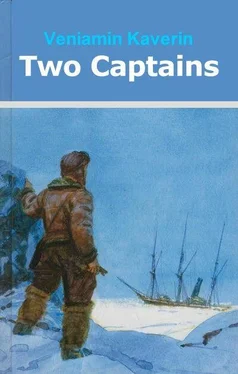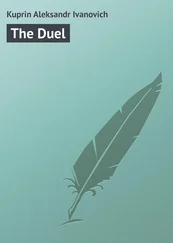But it was not the foreigners who engaged my attention those days, though I regarded them with keen but detached curiosity. This was the city of Sedov and Pakhtusov. At the cemetery in Solombala I stood for a long time at the grave of "Lieutenant Pyotr Kuzmich Pakhtusov, Cavalier of the Corps of Navigators, who died at the age of 36 from the trials and tribulations sustained on his voyages". From here Captain Tatarinov had taken his white schooner on her long voyage. Here Navigating Officer Klimov, the only surviving member of the expedition to reach the mainland, had died in the town hospital. The St. Maria expedition had an entire section devoted to it in the local museum, and among the familiar exhibits I found something new and interesting-the recollections of artist P., a friend of Sedov's, describing how Klimov had been found on Cape Flora.
Early in the morning, after writing my regular letter to Yaroslavl, I found myself at a loose end and went down to Kuznechikha. The pine wood spread its sharp tang over the river. The drawbridge was open and a little steamboat, weaving its way among the endless timber rafts, was carrying people to the dock. Wherever you looked was wood, everything was wooden-the narrow sidewalks along the fronts of the squat old buildings dating from Nicholas I's time and now housing hospitals and schools, the road paving, and fantastic edifices built of stacks of fresh-sawn planks along the river banks. This was Solombala, and here I found the house in which Captain Tatarinov had lived in the summer of 1912 when the St. Maria was being fitted out.
He had descended the steps of that little log-house and walked through the front garden-tall, broad-shouldered, in his white naval jacket, with moustaches turned up in the old-fashioned way. With stiffly bent head, he had listened to some Demidov of a merchant, who demanded money from him for salt junk or for the "preparation of ready-made clothing". And out there, in the cargo port, barely visible among the heavy merchantmen with side paddles, stood the slim and graceful schooner-too slim and graceful to make the voyage from Archangel to Vladivostok along the coast of Siberia.
One incident, insignificant in itself but important for me, brought these misty scenes oddly to life.
The day before a convoy had arrived I had gone to B. Port to see the foreign ships unload.
Oho, how big this ancient port had grown, how spacious! I must have walked a couple of kilometres along the wharves but still saw no end to the cranes, which were piling military and general cargoes in tall, rectangular stacks. And extensions were still being made to the port. I came to the end and stopped to take in the panorama of the wharves, which curved back in a smooth arc. At that very moment the little steamboat, puffing vigorously, steered clear of a big American vessel with a Hurricane in the bows and approached the wharf. I glanced at her name, Lebedin, and remember thinking that this pretty name had become sort of traditional in northern waters. It had been the name of the boat in which Tatarinov's friends and relations had gone out to his schooner to give the captain a last embrace and wish him a pleasant cruise and happy landfall. Could this be the same Lebedin, which had been called in one article "the first Russian icebreaker"? Surely not!
I asked a sailor who was rolling a barrel of fuel down the gangway to call his captain, and a minute later a ruddy-cheeked young fellow of about twenty-five, clad in ordinary work blues, came up on deck, wiping his hands, which were black with oil, on a rag.
"I have an historical question to ask you, Captain," I said. "Do you know by any chance whether this tug of yours was called Lebedin before the revolution as well?" "She was." "When was she launched?" "In 1907" "And always had the same name?" "Always."
I told him what it was about, and he surveyed his craft with an air of cool pride, as though he had never doubted that she would take her destined place in the history of the Russian fleet. It may sound rather funny, but the fact is that my encounter with the Lebedin cheered me up immensely. Although I had read the life of Captain Tatarinov, the last page of it still remained closed to me.
"This is not the end yet," that old tugboat with her ruddy-cheeked young skipper seemed to be saying to me. "Who knows, the time may yet come when you will succeed in turning that page and reading it."
On my third visit to the Personnel Officer I asked him to post me to a regiment, or, if that was impossible, to place me under the orders of the Northern Fleet Air Arm HQ.
He was obviously in the know as regards my personal affairs and service record, because, after a pause, he asked me in a kindly tone:
"What about your health?"
I told him I was as fit as a fiddle. It was the truth or pretty near the truth, for I always felt better in the North than I did in the South, the West or the East.
"Ah well, I suppose you'd better be put to use rather than hang about doing nothing at such a time," the Personnel Chief said reasonably if rather vaguely.
He had in mind, of course, my being used on the ground. "Catch me doing ground work. I'm going to fly," I said to myself as I watched his old but strong hand writing down and underlining my name on his desk diary.
I was appointed to an Arctic base within several kilometres of Polarnoye.
I am not going to say much about the air war in the North, though it was very interesting, since nowhere else were the qualities of the Russian airman displayed with such brilliance as here in the North, where, to all the difficulties and hazards of flying and fighting were added those of bad weather and six months of Arctic night. I heard one British officer say: "Only Russians can fly here." This was a flattering exaggeration, of course, but we had earned the compliment.
Combat conditions in the North were much more difficult than in the other theatres of air warfare. The German transports usually hugged the coastline, keeping as close to the cliffs as their draught would permit. It was hard to sink them, not only because transports, generally speaking, are hard to sink, but because it is impossible or well-nigh impossible to get a clear run-in at a transport which is under a cliff.
In July I went to Kirkenes with a load of bombs-with fair success, as the photographs showed. At the beginning of August I persuaded my regimental commander to let me go out "hunting" in search of German convoys. Paired with some lieutenant we sank a transport of four thousand tons. Strictly speaking, it was the lieutenant who did the sinking, as my torpedo, launched at too close range, slipped under the keel and went wide. But in that fight everything was put to the test, including my wounded leg, which behaved splendidly. I was pleased, although during the debriefing the squadron commander proved incontestably that this was just the way transports "ought not to be sunk". Two or three days later he had occasion to repeat his arguments, as I flew still lower over a transport, so low that I came home with a piece of the ship's aerial embedded in my wing. The transport-my first-was sunk, so that his arguments, while losing none of their cogency, acquired merely a theoretical interest.
To be brief, I sunk a second transport in the middle of August, one of six thousand tons, escorted by a patrol vessel and a torpedo boat. This time I was accompanied by the squadron leader himself and I noticed with amusement that he attacked from still lower than I did. Needless to say, he did not give himself a reprimand.
And so life went on-on the whole, not at all badly. At the end of October the Air Force Commander congratulated me on the award of the Order of Alexander Nevsky.
I already had friends at the base-the placid, taciturn, pipe-smoking navigator in the wide trousers turned out to be an intelligent, well-read man. True, he had little to say for himself, and that little was reduced to nil when we were in the air, but when asked, "Where are we?" he always answered with astonishing accuracy. I liked his way of getting onto the target. We were unlike each other, but you cannot help getting to like a man who shares with you every day the hard and hazardous work of flying and making torpedo attacks. If we were to meet death, it would be together, the same day and hour. And those who face death together, face life together.
Читать дальше












